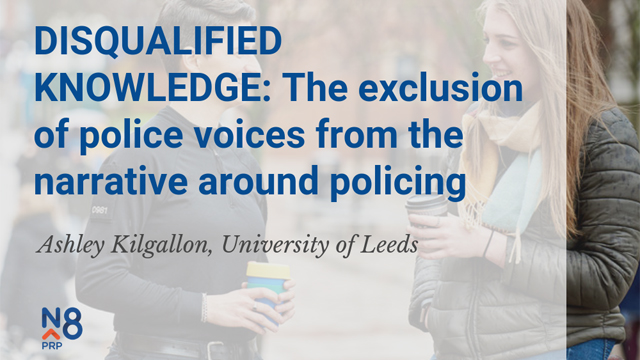
Disqualified knowledge: The exclusion of police voices from the narrative around policing
Written by Ashley Kilgallon, PhD Researcher at the University of Leeds
 I was driving to work yesterday morning at around 0640. I was grumpy. I was driving to my ‘money-job’ (as I call it, despite it not earning me much money) which I have whilst I finish studying. I hate it and the ‘money-job’ and ‘study-job’ often leave me tired and feeling sorry for myself. “It’s not early’s, late’s and night’s… It’s not quick change over… It’s not shifts on an over-worked response team, Ashley…” Is the decisive response from my father any time I seek sympathy… and he’s right.
I was driving to work yesterday morning at around 0640. I was grumpy. I was driving to my ‘money-job’ (as I call it, despite it not earning me much money) which I have whilst I finish studying. I hate it and the ‘money-job’ and ‘study-job’ often leave me tired and feeling sorry for myself. “It’s not early’s, late’s and night’s… It’s not quick change over… It’s not shifts on an over-worked response team, Ashley…” Is the decisive response from my father any time I seek sympathy… and he’s right.
It was this thought that immediately came to me yesterday when I heard reporters on BBC Radio 4 talking about Home Secretary Sajid Javid’s meeting with Chief Constables of forces affected by knife crime. One reporter commented on the low numbers of officers and how even with recruitment, an increase in numbers won’t happen over-night and due to this, current officers will just have to work more, or outside officers will have to transfer in to fill space. The short report didn’t offer much else. That was all the public would get before heading into work. I often get frustrated at a public ill-informed about policing, but with reports like that, we can perhaps understand it a bit more. This was the depth of complexity that was provided on a policing crisis – that officers will just have to work more. Then, again, this morning on the BBC a politician comments that police just need to reprioritise existing resources. Effectively, a more articulate way of saying ‘get your cops to work better/harder/more’ – pushing the responsibility back onto the forces, as though this problem is entirely their own… Yet, immediately it is so easy to challenge this thinking (challenge which is all too often absent) – how can forces nationally be strategically committed to well-being and then potentially require their already strained officers to work more or within a different force?
I am not an expert in knife crime, the policing of it, or how to fix the problems we see before us. But, this thought-piece isn’t really about any of the that. It’s more focused on the empty rhetoric I often hear about policing. Ethnographers always tell students that the best part of the PhD process is the fieldwork – it’s the most fun! You’re out and about! You’re not stuck behind a desk reading endless texts! But, if I’m honest, the best part about fieldwork – for me – was the depth of debate I was able to engage in daily with front-line officers. People who (more often than not) just utterly understood their business. So many of the officers I met with challenged (and encouraged) my learning, enabling me to continually problematise my understanding of policing and become a better scholar.
My reflection upon the empty rhetoric I hear so often, especially within news media and political statements, is that these individuals clearly aren’t regularly engaging with police, least of all in an authentic manner. It gets reported that the Home Secretary is meeting with senior police leaders after there is another knife related killing. Our PM Theresa May tells us there is no correlation between police numbers and knife crime – after yet another young person is stabbed to death. On prime-time news media we hear/see reporters’ shallow analysis of police/policing whilst so often interviewing other reporters.
During fieldwork I spent some time with a specialist public-order unit. During one of these nights, whilst on a quieter period, I stood and spoke with a Constable for some time about stop-and-search. To this day I’m not entirely convinced he wasn’t tasked with keeping me out of the carrier for a while, so everyone could relax a bit away from ‘that bloody student asking question’ (cop culture at its finest). Regardless, it remains in my memory as such an inspiring and knowledge building conversation. Listening to how passionate this Constable was about the appropriate and effective use of stop-and-search, about the tactics that can be deployed for best results and the absolute necessity of skill and respect when engaging with the citizen. He told me how during his own time (along with another colleague) he would go and teach less experienced officers about how best to use the tactic – something that is apparently required due to poor levels of stop-and-search training and officers feeling ill-informed on the tactic.
Another time I was observing an officer within a different specialist squad. He would appear to me seemingly fully engaged in our conversation until he’d suddenly turn up the radio – an interesting call his attuned ears had picked up on. Later, he would appear to be looking out of the car window at nothing, just cruising and speaking, until he’d suddenly show interest in a specific group of people. His informed eye had spotted something interesting, something out of place, something he wasn’t quite sure about. His car slows and he leans back watching the group. They spot him, one in particular holds his gaze for a short moment and then looks away. We drive off. He was expertly looking for behaviours learned over many years of policing from the group or any individuals within it that might require police attention.
Another time, again with a public order unit, a car was stopped due to fitting a report provided to the unit. One of the people within the vehicle was irate at being stopped. Shouting that they knew their rights and that they were going to get their family member who was a solicitor to come to the stop. The street performance was… impressive. Loud, angry and utterly determined to profess innocence. Ironically, the individual was subsequently arrested for fraud offences. During this whole street performance one Sergeant in particular kept calm and cool – totally unphased by the individual’s performance. Later he comments, “as they raise their voice Ashley, you just keep lowering yours. You get quieter and quieter, eventually they have to come down to your level so they can hear what you’re saying. Then your conversation can properly begin.” This Sergeant knew how to get people who weren’t ‘onside’ to eventually engage with him – and he did it all whilst standing quietly.
These are just some very cursory examples of “skilled mediators” (Barker 2014) – experts in their business. Yet, it is these experts who appear (to me) distinctly absent from the narrative around how to solve policing issues. During my fieldwork I wanted to understand the experiences of police officers in doing their role – how people reacted to them, how they reacted to people, their emotions – including that of anger and frustration. I wanted to understand, from a worm’s-eye point of view, what these officers experienced when they are deployed. I understand that police officers are a unique group of people who hold warranted power, representatives of state power – I get that (and we should never forget it), but I increasingly feel this is where our debates with police officers stop. As though due to their membership in this policing group their knowledge, experiences, emotions and perspectives are somehow illegitimate, mis-informed, or tainted.
Through my different experiences I am becoming gradually more conscious of a sentiment that the knowledge rank-and-file officers hold is ‘disqualified knowledge’ defined as, “…a whole set of knowledges that have been disqualified as inadequate to their task or insufficiently elaborated: naïve knowledges, located low down on the hierarchy, beneath the required level of cognition…” (Foucault 1977: 81, emphasis added). As if the knowledge of street-cops is somehow not good enough. Yet, if we have a street-based problem, do we not fundamentally require street-based knowledge?
Now I’m not suggesting every officer out there has the ability to articulate themselves in written (or verbal) prose with the quality of John Van Maanen (police scholar). But I am saying they are the very people who hold the vital knowledge of these areas we all want and desperately need to improve – those in positions of power just need to ask the right questions but more importantly, listen! This is also not to suggest that the policing knowledge is the only knowledge that will help solve our criminal justice problems. It’s vital to understand the experiences of those who interact with the police and those at the receiving end of crime or violence. But to build informed and effective policing you can’t just have binary responses to issues:
“Stop-and-search is being over-used in ethnic minority communities, IT’S CRIMINAL, IMMEDIATELY STOP USING THIS TACTIC!!”
Then, a short while later:
“KNIFE CRIME HAS ROCKETED, POLICE TO START USING STOP-AND-SEARCH IMMEDIATELY!!”
This binary approach to problems not only harms confidence of policing within different communities, it also harms confidence of policing tactics amongst police officers.
For me there is a class issue at play, an issue of respect and respecting the knowledge of those who perhaps see their professional expertise more as a ‘craft’ than expert knowledge. Policing has often been associated with a lower-middle class job (although, I would suggest this is changing) and it seems that as a result those in positions of ‘outside’ power (and sometimes ‘inside’ power too) dismiss the knowledge rank-and-file hold. It appears as though the views of those at the front end of the business (as opposed to the top end) are perceived as “low down the hierarchy”, “beneath the required level of cognition…” In short, their expert knowledge is disqualified.
Yet, it is these very people that tirelessly work with the tactics widely debated within the communities often forgotten (once the headlines of murdered people have past). We would not perform heart surgery without consulting a surgeon. So, in what world would we ever contest the current state of policing without consulting those charged with doing the actual job? Respecting and utilising the expert knowledge held by rank-and-file officers would enhance debate. It would drive complexity of the debate upwards, enabling informed insight into complicated problems and it would move us beyond the shallow rhetoric of, “they will just have to work more.”
Article was originally published through LinkedIn.









0 Comments